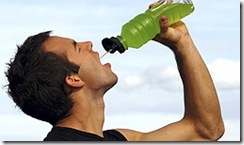 Food sensitivities and intolerances are problematic to athletes and non-athletes alike, however they appear to be somewhat more prevalent in athletes. It could be that athletes are just more tuned into their bodies than most people so are more apt to notice when things aren’t functioning well. However, athletes may actually be slightly more susceptible to symptoms of food sensitivities because the stress of constant training can tax the immune system, giving athletes a lower threshold of tolerance to foods to which they have some level of sensitivity. Likewise, if training results in temporary inflammation of muscles or joints, inflammation caused by food sensitivities may further exasperate this and result in painful movement that interferes with training. Gastrointestinal problems due to food sensitivities can be more than inconvenient if they interfere with training and athletic events. Frequent or unpredictable diarrhea is unwelcomed by anyone, but can sideline an athlete if not corrected. When athletes experience any of these symptoms it is important to identify if it is the food itself, or if it is simply a matter of how foods and beverages are consumed in relation to exercise training that is causing problems.
Food sensitivities and intolerances are problematic to athletes and non-athletes alike, however they appear to be somewhat more prevalent in athletes. It could be that athletes are just more tuned into their bodies than most people so are more apt to notice when things aren’t functioning well. However, athletes may actually be slightly more susceptible to symptoms of food sensitivities because the stress of constant training can tax the immune system, giving athletes a lower threshold of tolerance to foods to which they have some level of sensitivity. Likewise, if training results in temporary inflammation of muscles or joints, inflammation caused by food sensitivities may further exasperate this and result in painful movement that interferes with training. Gastrointestinal problems due to food sensitivities can be more than inconvenient if they interfere with training and athletic events. Frequent or unpredictable diarrhea is unwelcomed by anyone, but can sideline an athlete if not corrected. When athletes experience any of these symptoms it is important to identify if it is the food itself, or if it is simply a matter of how foods and beverages are consumed in relation to exercise training that is causing problems.
Athletes – especially endurance athletes – may also experience gastrointestinal (GI) problems resulting from food intolerances that are directly related to exercise and which are not a present when not exercising. When athletes are active, supplying the working muscles with oxygen and nutrients is a priority so blood is shunted from the gut to the working muscles. The resulting decreased oxygen supply to the gut (ischemia) is thought to be the leading cause of nausea, vomiting, abdominal pain and diarrhea associated with exercise. Likewise, research has shown that dehydration and delayed emptying of the stomach are the most common causes of GI complaints during exercise. When food and/or liquid are slow to empty out of the stomach into the intestines where they are absorbed, they sit in the stomach and cause nausea. When liquid is slow to empty out of the stomach it can “slosh” uncomfortably – a complaint familiar to runners. Some athletes such as rowers who compete in short, but very intense time trials and similar activities often experience nausea and/or vomiting after such events. Adjustments in nutrition and hydration can sometimes help reduce these adverse effects.
 Though exercise induced ischemia to the gut contributes to the delayed stomach emptying, proper fueling and hydration can help compensate for this. If appropriately diluted, the right composition of food and drinks can be readily digested and absorbed, but when too concentrated in the gut they are slow to be absorbed. Plain water is easily absorbed, but doesn’t provide fuel or sodium necessary for optimal performance when exercise exceeds 90 minutes. Fat is slow to be digested and absorbed and will slow down the absorption of anything else in the stomach. Ingestion of foods high in fiber and/or protein have also been linked to gastrointestinal problems in athletes during training. While isolated proteins (such as whey protein isolate) are fairly readily absorbed when not too concentrated, they are not an efficient source of energy during exercise. Carbohydrates are the body’s preferred source of energy during exercise, easily absorbed and readily utilized for fuel, but must be ingested in the right form and concentration to avoid gastric upset. Simple carbohydrates (sugars) are more easily absorbed than complex carbohydrates, but are a concentrated form of carbohydrate which must be properly diluted. Sports drinks that are 6% to 8% carbohydrate (about 15 to19 gm. carbohydrate per 8 oz. of fluid) are optimally absorbed. Likewise, sport gels and chews should be consumed with enough water to similarly dilute them. (See chart for recommended water to drink with sports gels and chews.) When consumed without enough water, this can cause nausea and/or diarrhea. Having too high of a concentration of carbohydrates in the gut is often the cause of “runner’s diarrhea.” Research also suggests that combinations of 2 or more types of carbohydrates are more readily absorbed than a single type of carbohydrate during exercise. This is why many sports drinks and supplements contain several different types of sugars (simple carbohydrates which are readily absorbed). If an athlete only experiences GI problems during exercise, there is a good chance the problem is not due to food sensitivities but rather to exercise-related intolerances. If symptoms are present at other times, the possibility of food sensitivities should be explored.
Though exercise induced ischemia to the gut contributes to the delayed stomach emptying, proper fueling and hydration can help compensate for this. If appropriately diluted, the right composition of food and drinks can be readily digested and absorbed, but when too concentrated in the gut they are slow to be absorbed. Plain water is easily absorbed, but doesn’t provide fuel or sodium necessary for optimal performance when exercise exceeds 90 minutes. Fat is slow to be digested and absorbed and will slow down the absorption of anything else in the stomach. Ingestion of foods high in fiber and/or protein have also been linked to gastrointestinal problems in athletes during training. While isolated proteins (such as whey protein isolate) are fairly readily absorbed when not too concentrated, they are not an efficient source of energy during exercise. Carbohydrates are the body’s preferred source of energy during exercise, easily absorbed and readily utilized for fuel, but must be ingested in the right form and concentration to avoid gastric upset. Simple carbohydrates (sugars) are more easily absorbed than complex carbohydrates, but are a concentrated form of carbohydrate which must be properly diluted. Sports drinks that are 6% to 8% carbohydrate (about 15 to19 gm. carbohydrate per 8 oz. of fluid) are optimally absorbed. Likewise, sport gels and chews should be consumed with enough water to similarly dilute them. (See chart for recommended water to drink with sports gels and chews.) When consumed without enough water, this can cause nausea and/or diarrhea. Having too high of a concentration of carbohydrates in the gut is often the cause of “runner’s diarrhea.” Research also suggests that combinations of 2 or more types of carbohydrates are more readily absorbed than a single type of carbohydrate during exercise. This is why many sports drinks and supplements contain several different types of sugars (simple carbohydrates which are readily absorbed). If an athlete only experiences GI problems during exercise, there is a good chance the problem is not due to food sensitivities but rather to exercise-related intolerances. If symptoms are present at other times, the possibility of food sensitivities should be explored.
For more information on identifying food intolerances in athletes see my article in Training and Conditioning, May-June 2012


great post
It appears that you’ve put a good amount of effort into your article and I demand a lot more of these on the World Wide Web these days. I truly got a kick out of your post. I do not have a bunch to say in reply, I only wanted to register to say “phenomenal work!”.
[WORDPRESS HASHCASH] The poster sent us ‘793421184 which is not a hashcash value.
Very nіce aгticle, just whаt Ӏ nееdеd.
[WORDPRESS HASHCASH] The poster sent us ‘0 which is not a hashcash value.